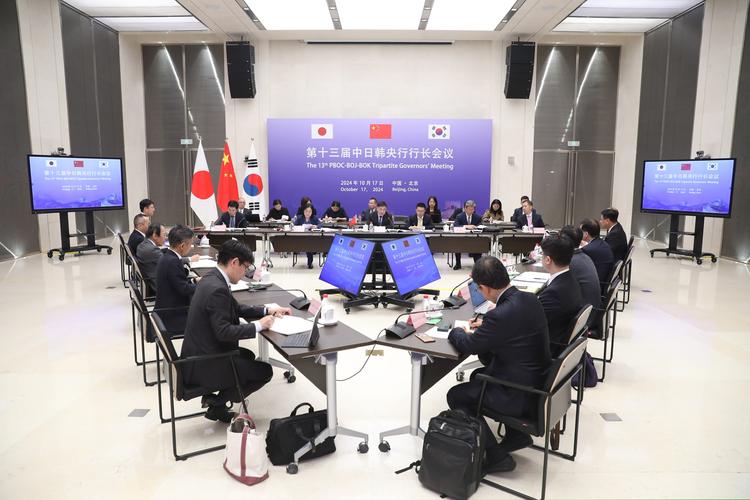
China, Japan and South Korea resume Trade Council of Ministers of Bosnia and Herzegovina after 51/2 years. The ministers in charge of economy and trade of the three countries co-chaired a meeting in Seoul Wednesday, exchanging views on strengthening trade and investment cooperation, regional and multilateral cooperation and reaching broad consensus.
South Korean trade and Resources Minister Andergen, Ministry of Commerce of the People’s Republic of China Minister Wang Wentao and Japanese trade minister Takefuji Yongji attended the meeting, Yonhap news agency reported Wednesday. The economic and trade departments of the three countries agreed to strengthen cooperation under regional and multilateral frameworks such as the World Trade Organization, the Regional Comprehensive Economic Partnership (RCEP) and the Asia-Pacific Economic Cooperation, we will discuss how to speed up the negotiation of a free trade agreement among China, Japan and the ROK. “The three sides also agreed to cooperate closely in creating a predictable business environment, stabilizing the supply chain, strengthening communication related to export controls, and promoting the development of a green and digital economy,” Yonhap said.
It was the first economic and Trade Council of Ministers of Bosnia and Herzegovina in more than five years. Lu Hao, a Chinese Academy of Social Sciences researcher at the Institute of Japanese Studies and Director of the Office of Comprehensive Strategic Studies, told the Global Times on the 30th that in the past five and a half years, the outbreak of the Covid-19 has led to the suspension of the trilateral mechanism; in addition, Japan and South Korea have followed the US strategy to strengthen checks and balances with China, and the trilateral cooperation among the US, Japan and South Korea has strained the security situation in northeast Asia; coupled with changes in domestic politics in Japan and South Korea, co-operation between China, Japan and South Korea has stalled.
“However, the close geopolitical and economic ties between China, Japan and South Korea objectively exist. It is very unlikely that the United States will guide Japan and South Korea to de-risk or even decouple from China,” Lu said, “At the same time, President Donald Trump’s new policies have increased anxiety among Asian allies such as Japan and South Korea. To deal with the US shock, Japan and South Korea need to return to the path of strengthening regional co-operation and improving exchanges with China,” he said, with China’s active promotion, it is a major trend for China, Japan and the ROK to resume trilateral cooperation in diplomacy, security, economy and trade.
Both Japanese and South Korean media have cited the Trade Council of Ministers of Bosnia and Herzegovina as a backdrop to Washington’s tariffs or plans to impose tariffs on a number of countries, including its trading partners. “The significance of [ the meeting ] is to jointly discuss how to meet the challenges and promote the development of a free trade order based on the common interests of the three countries,” Yonhap said, citing South Korea at the meeting, at present, the global economic and trade environment is undergoing tremendous changes. The meeting of the economic and trade ministers of South Korea, China and Japan is of great significance to the three countries themselves and the international community.
Wang Wentao met Andergen in Seoul the day before the Trade Council of Ministers of Bosnia and Herzegovina. “China has told South Korea that China and South Korea are both beneficiaries of Free Trade and Multilateralism, and has proposed to jointly safeguard the multilateral trading system by promoting negotiations on a free trade agreement among China, Japan and South Korea,” the Chosun Ilbo reported, the move was interpreted as“China extending a helping hand to South Korea and Japan to promote change in the context of the US administration’s indiscriminate pressure on South Korea and Japan under the pretext of ‘America First’”.
According to an analysis by the Nihon Keizai Shimbun, although the china-japan-south Korea joint statement avoids naming the United States, it does include the content of“Creating a global level playing field.” “This demonstrates the stance of the three countries against the US Government’s ‘America First’ economic and trade policy of imposing tariffs on products such as steel and automobiles.”. The report also said that in the U. S. economic and trade, China, Japan and South Korea are facing the risk of tariffs, dialogue is conducive to creating a unified pace of the three atmosphere.
According to a report by Japan’s“Daily News,” China, Japan, and South Korea, as the three major economies in Asia, account for about 25% of the global GDP in terms of economic size, and their foreign trade volume accounts for about 21% of the global total, all three countries stressed the need for closer economic and trade cooperation. The statement after the meeting showed that the three countries would push for faster negotiations on a free trade agreement“To boost regional and global trade,” Reuters said. The report noted that since the start of negotiations in 2012, the trilateral free trade agreement has not made much substantive progress. The RCEP framework, agreed by 15 asia-pacific countries to reduce trade barriers, will enter into force for signatories from 2022.
Lu Hao said that China, Japan and South Korea have already defined a series of reciprocal conditions and entry barriers in the framework of RCEP. On the basis of this achievement, the three countries will strengthen consultations and negotiations on the free trade area among the three parties, including trade in goods, trade in services, and even further market opening and mutually beneficial policies, it would allow the three parties to anchor more closely on a common understanding of mutual benefits through regional development.